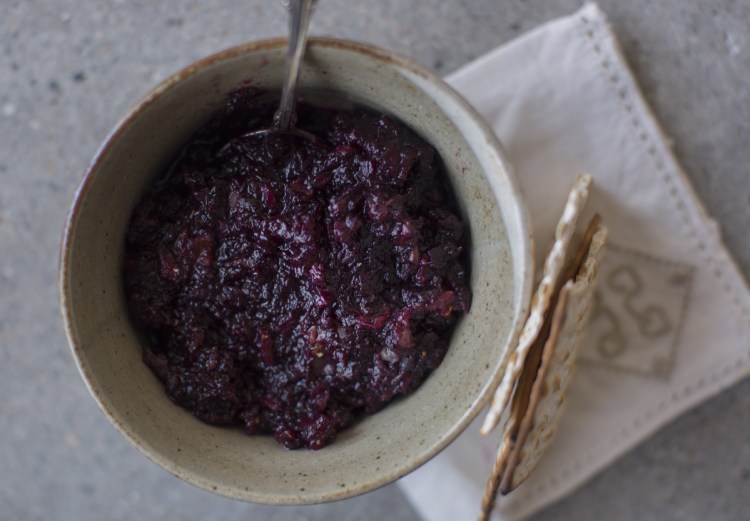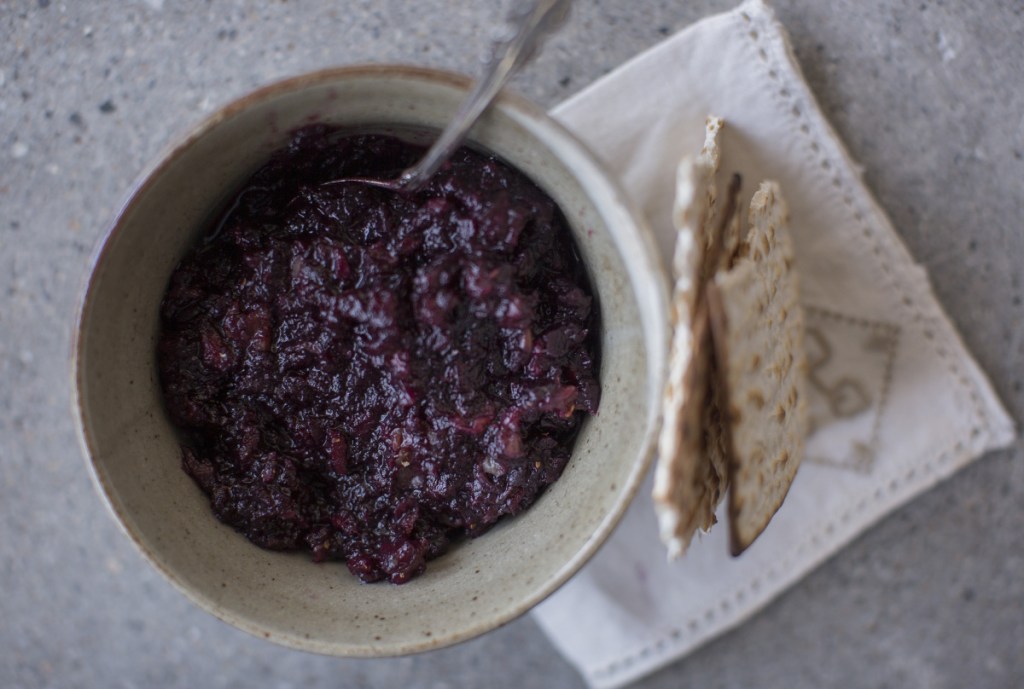On a culinary armchair tour one evening some months back, cookbook and cat in my lap, I thumbed through Joan Nathan’s latest, “King Solomon’s Table: A Culinary Exploration of Jewish Cooking from Around the World.” I flipped past the Tunisian Brik with a Fried Egg, past the Indian Chicken with Cardamom, Cumin, and Cilantro, past the Cashew Nut Strudel with Guava and Lime, when what should I find but a recipe from Belfast, Maine.
The recipe was for haroset, a sweet, paste-like spread that Jews make each year for Passover, an eight-day holiday commemorating their escape from slavery in Egypt thousands of years ago. According to Passover teaching, haroset symbolizes the mortar that the enslaved Israelites used to adhere the bricks as they built the pyramids. This year, Passover begins on Friday evening.
Nathan, arguably America’s best-known expert on Jewish food, credits the recipe to a Judy Stein of Belfast, who, Nathan writes, concocted with friends “what has become their traditional Maine haroset, with blueberries, cranberries, and, as a nod to eastern European haroset, an apple.”
There are almost as many variations of haroset as there are arguments among Jews about who makes the best bagel. Scratch that seasonally inapt simile – Jews may not eat “chametz,” defined as bread or any other leavened products, during Passover. Recipes for haroset variously call for apples, pears, dates, raisins, chestnuts, pine nuts, pistachios, lemon or orange juice, pomegranate seeds, cinnamon, cardamom, and more. As early as the eighth century BCE, Jews began to wander the world in search of safety, freedom from prejudice and trade. Jewish food today reflects what eventually became global roots, so it seems only right that Maine – with an estimated 14,000 Jews – should have a tailor-made haroset.
The apple, cranberries and blueberries in this recipe all grow in Maine, of course, and the maple syrup and honey used also can carry “made in Maine” stamps. Stein/Nathan’s recipe incorporates fresh ginger root, which, Nathan notes, is “definitely not from Maine.” It may not be from Maine, but like the handful of Jews who arrived in the region as early as the colonial period, it resides here now. In October, you can occasionally find young ginger, mild and soft-skinned, at the Portland Farmers’ Market. A co-worker’s in-laws grow it at Morning Glory Farm, their hobby farm in North Yarmouth; he tells me that the seedlings, just getting started now, much prefer warm humid temperatures to all the snow we have had this month.
My own family is Ashkenazi, meaning our background is European, and I grew up eating the classic Ashkenazi haroset, which is made from chopped apples, chopped walnuts, cinnamon and a few spoonfuls of kosher-for-Passover Manischewitz wine. That last appealed to me as a child because it is exceedingly – excessively – sweet. I did not use it when I tested this Maine haroset, but after I’d finished cooking, it occurred to me that I should have for a more fully realized locavore (at least in theory) haroset; Manischewitz is made from Concord grapes, which happily grow in Maine.
Even more than most other foods, haroset feels personal. Religiously, it may symbolize mortar, but personally it calls forth Passovers past with my Kadonoff cousins, some of whom, oddly enough, now live in Belfast. It also calls forth my mother. In my mind, the cookbook we are looking at is not Nathan’s, but “Second Helpings Please,” produced by the Mount Sinai Chapter Montreal of B’nai B’rith Women of Canada, and a copy of which my Montreal-born-and-raised mother gave to each one of her daughters when we left home.
Peggy Grodinsky can be contacted at 791-6453 or at:
pgrodinsky@pressherald.com
Twitter: PGrodinsky
Maine Haroset with Blueberries, Cranberries, and Ginger
Recipe from Joan Nathan’s “King Solomon’s Table: A Culinary Exploration of Jewish Cooking from Around the World.” This haroset has an exceedingly powerful ginger kick or, more accurately, blast. Next time I make it, I’ll try cutting the amount of ginger in half. On the other hand, you eat haroset with matzo, the holiday’s bland unleavened bread. Jews sometimes joke that matzo is literally the bread of affliction, not just symbolically, so perhaps it benefits from a burst of ginger.
Yield: about 2 cups
3/4 cup (125 grams) dried blueberries
3/4 cup (105 grams) dried cranberries
3/4 to 1 cup (180 ml) sweet kosher wine
1 tart apple, diced and peeled
1/3 cup ginger root (30 grams), peeled and sliced into toothpick-size strips
1/3 cup (50 grams) golden raisins
1/4 cup (60 ml) wine vinegar
1/2 teaspoon ground cinnamon
2 tablespoons maple syrup or honey
1. Soak the dried blueberries and cranberries in 3/4 cup of the wine for several hours, or overnight, until soft.
2. Put the berry-wine mixture with the apple, ginger, raisins, wine vinegar and cinnamon in a medium saucepan and cook over medium heat 10 to 12 minutes, or until the apples are soft. Process in a food processor until combined, but not completely pureed. Add maple syrup or honey to taste and, if needed, 1/4 cup more wine.
Copy the Story LinkSend questions/comments to the editors.





Success. Please wait for the page to reload. If the page does not reload within 5 seconds, please refresh the page.
Enter your email and password to access comments.
Hi, to comment on stories you must . This profile is in addition to your subscription and website login.
Already have a commenting profile? .
Invalid username/password.
Please check your email to confirm and complete your registration.
Only subscribers are eligible to post comments. Please subscribe or login first for digital access. Here’s why.
Use the form below to reset your password. When you've submitted your account email, we will send an email with a reset code.